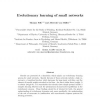1629 search results - page 149 / 326 » Evolutionary Multi-agent Systems |
76
Voted
COMPLEXITY
2008
15 years 2 months ago
2008
Results are presented of a simulation which mimics an evolutionary learning process for small networks. Special features of these networks include a high recurrency, a transition ...
107
Voted
CONNECTION
2004
15 years 2 months ago
2004
In this paper we discuss the limitations of current evolutionary robotics models and we propose a new framework that might solve some of these problems and lead to an open-ended e...
177
Voted
Publication
A large class of systems of biological and technological relevance can be described as analog networks, that is, collections of dynamic devices interconnected by links of varying s...
147
click to vote
ENGL
2007
15 years 2 months ago
2007
— In this work, an hybrid, self-configurable, multilayered and evolutionary subsumption architecture for cognitive agents is developed. Each layer of the multilayered architectur...
153
Voted
GECCO
2003
Springer
15 years 7 months ago
2003
Springer
Abstract. Many multi-robot systems are heterogeneous cooperative systems, systems consisting of different species of robots cooperating with each other to achieve a common goal. T...


